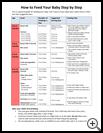
How to Feed Your Baby Step by Step
This is a general guide for feeding a baby. Your baby may eat a little more or a little less than this guide suggests.
0 to 4 months
Breast Milk
Until your milk supply is well established (usually 4 weeks), nurse your baby whenever he cries or seems hungry (demand feeding). After that, babies can receive enough milk by nursing every 2 to 2-and-1/2 hours for 5 to 10 minutes on each breast.
Formula
Age # times/day serving size ----------------------------------------------------------- 0 to 1 Month 6 to 8 times 2 to 4 oz ----------------------------------------------------------- 1 to 2 months 5 to 7 times 3 to 5 oz ----------------------------------------------------------- 2 to 3 months 4 to 6 times 4 to 7 oz ----------------------------------------------------------- 3 to 4 months 4 to 6 times 5 to 8 oz -------------------------------------------------------------
- Never prop a bottle. Always hold the baby to feed.
- Don't microwave bottles.
- Don't force a large feeding amount. 6 wet diapers a day are a good sign your baby is getting enough.
- Never give honey to babies. Honey may cause a serious disease called botulism in children less than 1 year old.
4 to 6 months
Breast Milk or Formula
- 4 to 6 times per day, 6 to 8 oz at each feeding
- Don't prop the bottle. Propping the bottle can cause tooth decay and cause an overbite of the upper teeth. Never put a baby in bed with a bottle.
- Use a pacifier if the baby wants to suck.
Grains
Your baby is ready for cereal when she is able to hold her head up well, likes having food in her mouth, and can swallow it easily. Use a spoon to give your baby cereal, not a bottle or an infant feeder.
- Rice cereal 1 to 2 times per day, 1 to 2 tbsp. servings
- Start cereal if baby is taking over 32 oz per day.
- Don't put cereal in a bottle.
6 to 8 months
When your baby is 6 months old, you can start giving a cup, but expect some spills. Most babies are not ready to use an open-rimmed cup until 9 to 18 months of age.
Breast Milk or Formula
- 3 to 5 times per day, 6 to 8 oz servings
- Give breast milk or formula before giving solids.
Grains
- Rice Cereal 3 to 5 times per day, 2 to 4 tbsp. servings
- Don't heat in microwave.
Fruits & Veggies
- Strained fruits and vegetables, 2 to 4 times per day, 2 to 3 tbsp. servings
- Keep solids refrigerated.
- Start one fruit or vegetable at a time and watch to see if your baby is allergic (symptoms include sneezing, itchy or watery eyes, stuffy or runny nose, red areas on the skin, or vomiting)
- Don’t give foods in chunks.
8 to 12 months
Breast Milk or Formula
- 3 to 4 times per day, 6 to 8 oz servings
- Your baby can hold the bottle but don’t give a bottle in bed.
- Try using a cup.
Other Dairy Foods
- Yogurt, 1/4 to 1/2 cup servings
- Cottage cheese, 1 to 2 tbsp. servings
Grains
- Baby cereal, crackers, bread, or dry cereal, 1 to 2 times per day, 2 to 4 tbsp. servings
- Start with finger foods.
- Feed your baby in a high chair.
- Feed only foods that will dissolve in the mouth.
Fruits & Veggies
- Strained or mashed fruits or vegetables, 3 to 4 times per day, 3 to 4 tbsp. servings
- Fruit juice (not orange) 1 time per day, 4 oz in cup
- Juice does not replace milk.
- Give juice in a cup.
Meat
- Strained chicken, beef, or dried beans, 1 to 2 times per day, 3 to 4 tbsp. servings
- Do not give hotdogs or pieces of meat that need chewing.
Age 1+ years
- You may give whole milk instead of formula. Your child may also have small amounts of citrus juice, honey, and whole eggs after 1 year of age.
- Many children are ready to start to use an open-rimmed cup at this age. Weaning to a cup can help prevent tooth decay.
- Continue to have meals in a high chair or at the table. Be patient, messes are going to happen.
- DO NOT allow your child to walk around and eat small amounts of food frequently (grazing).
- Do not add peanuts, tree nuts or shellfish to your child's diet until 2 or 3 years of age due to the risk of allergies.
- Give your child snacks at the table. Snacks are important for baby's increasing energy needs.
Last modified: 2014-11-04
Last reviewed: 2016-05-11

